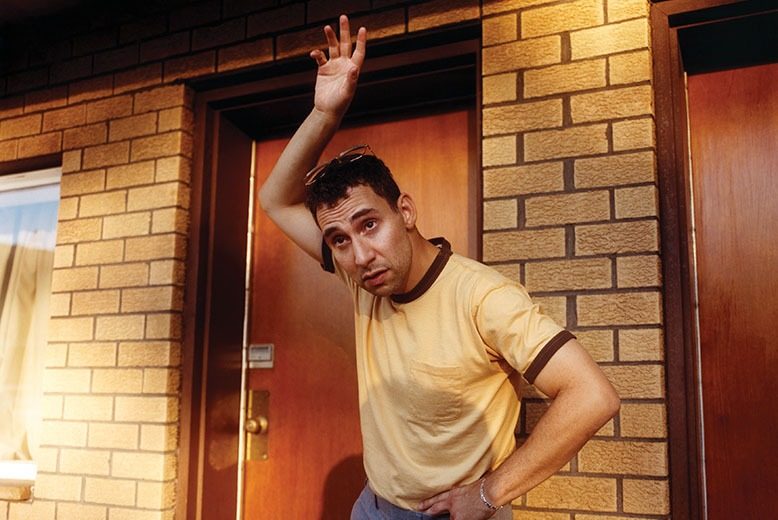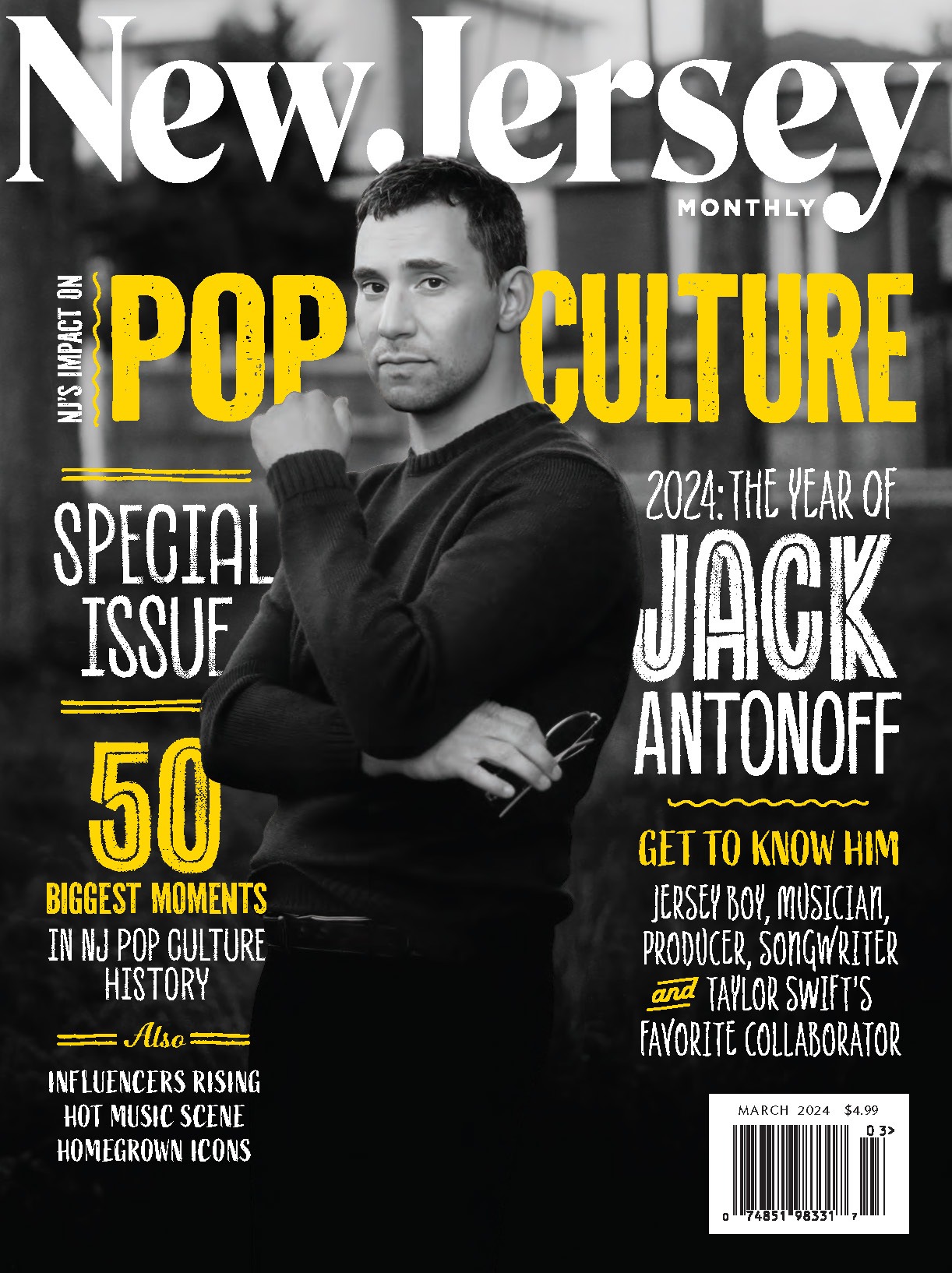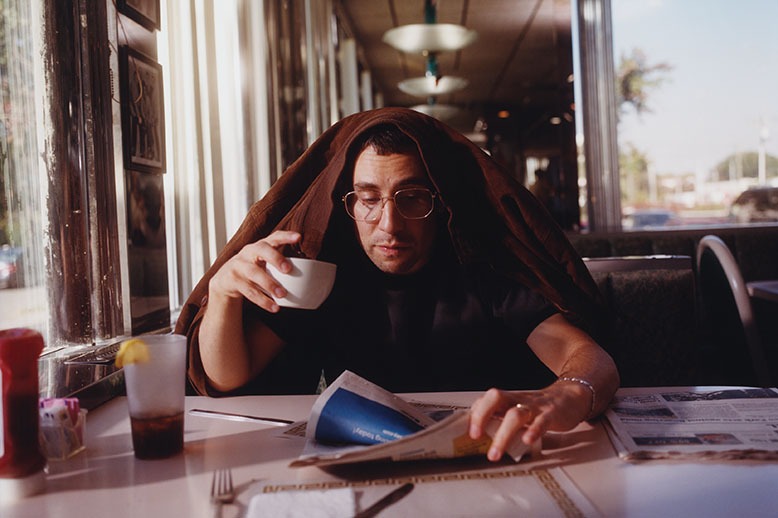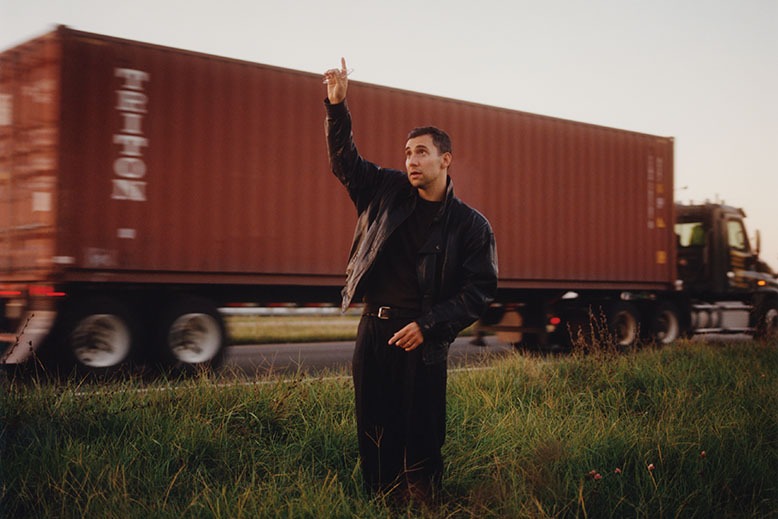
When a guitar-wielding Jack Antonoff ambled onto the stage at MetLife Stadium last May—about 25 minutes from the Bergen County suburbs of his childhood—he fiddled for a moment with the lapels of his leather jacket, brushing them aside to bare the bold yellow lettering splashed across his signature T-shirt: “Welcome to New Jersey. Now, go home.” Delighted cheers rippled through the already roaring crowd of 82,000 fans.
Antonoff’s longtime collaborator and close friend Taylor Swift had just called him onstage as her first surprise guest for night one of three sold-out New Jersey shows on her Eras Tour, the omnipresent musical phenomenon of 2023.
The pair performed a playful acoustic rendition of “Getaway Car”—a song they cowrote for Swift’s 2017 Reputation album and whose studio inception was partially captured on film. As later shown in the 2020 documentary Miss Americana, Swift and Antonoff composed aloud four finished lines in a fevered span of less than 30 seconds. (The since-viral scene has been memed and even Halloween costumed by fans far and wide.)
“A few miles away [from MetLife], that song was made in this tiny little space,” Antonoff recalls to New Jersey Monthly, referring to his cozy, 200-square-foot Brooklyn home-recording studio, wallpapered with the same colorful tiger design from his boyhood bedroom. Over the course of the past decade, this studio has become the fabled, fertile ground for many of his prolific music-making endeavors, including writing and producing partnerships with some of the world’s most renowned pop stars: Lana Del Rey, Lorde, St. Vincent, Clairo and, of course, Taylor Swift. “It’s crazy,” he continues. “The coolest part, though, is also to play to that many people, acoustic, and have it feel massive and explosive.”
Antonoff has always worn duality well. The Bleachers frontman and former fun. guitarist, who turns 40 on March 31, took home his 10th Grammy earlier this month, including his third consecutive producer of the year award. (Swift declared him a “once-in-a-generation producer” while accepting the Grammy for album of the year, Midnights, which Antonoff coproduced.) But among many artists and fans, he’s known as much for his high-powered musical prowess as he is for his empathic and largely egoless studio presence. For all his fame and commercial success, he seems sustained by one solemn pursuit: making good songs. “Age, or success, or lack of success, or accolades…all these external things, they just sort of get left at the door when I go into work,” he says.

Buy our March 2024 issue here. Cover photo: Alex Lockett
While Antonoff’s comfort zone is most closely affiliated with 20- to 40-something women, he also weaves gracefully among genders, genres and generations. He’s worked with Harry Styles, the 1975, Diana Ross and the “brilliant” Patti Scialfa, whose “ornate…sad and grimy…beautiful” forthcoming album he calls “some of my favorite music ever.”
In his own indie rock band, Bleachers, whose new self-titled album is out March 8, Antonoff’s work is simultaneously aching and anthemic, sorrowful yet hope suffused. “When two people are looking at a painting and one person sees a dead body, the other person sees a flower, right?” Antonoff muses. “You hear a song and it’s the saddest thing you’ve ever heard; your friend hears it and they want to, like, bump it in their car and party.”
Antonoff grew up idolizing New York City from the North Jersey suburbs, only to move there and realize just how much mystery and majesty his home state holds. These days, Antonoff and his wife, the actress Margaret Qualley, relish the quietude of Long Beach Island—where they own a home equipped with a small studio, just three blocks from the house where Antonoff vacationed as a child. “It’s the best place, and we’re living there year-round now…basically anytime I don’t have to be in the city, we’re in LBI. And I actually prefer it in the winter. It’s really sweet, and just a really nice, small town.” He adds, “I don’t get wrapped up in dumb shit when I can look out at the ocean. It’s real perspective-shifting to see a large body of water—it kind of makes you just want to focus on the things that really matter.” Antonoff and Qualley even tied the knot on LBI this past August at Parker’s Garage, in front of celebrity friends including Swift, who caused quite the commotion when she arrived in town.
[RELATED: The 50 Biggest Pop Culture Moments in New Jersey]
For years, Antonoff has been gripped by not just an unabashed pride for the Garden State, but also a frenetic obsession with its mythology, especially as it relates to New York City. He philosophizes: “The amount of literal energy that’s shooting off of…Manhattan, in proximity to where I grew up—what does that do when it hits New Jersey and sort of dissipates? I think it creates such a funny place that lives in…the shadow of all that energy.”
Childhood drives meant constant confrontation with the skyline. Being so close to a “totally different life,” he says, is a “powerful, very medieval concept.” Jersey music, he once told Seth Meyers, elicits feelings of “a torch worth carrying.”
Bleachers songs—synth-heavy, horn-haunted—are steeped in such meditations. Antonoff often sets mournful lyrics to deceptively boisterous sounds—a sensibility he gleaned in part from his local predecessors and contemporaries. New York music, he explains, “can be more pulled back…and relaxed…because people are going to pay attention either way.” But Jersey has to make more noise. “From Sinatra to Southside Johnny to E Street to Gaslight Anthem to My Chemical Romance—all this music, it just flies out at you, daring you to listen and dig into what is being said there,” he says. “I think a big part of the New Jersey sound is having to deliver a lot of sadness with a lot of fireworks—because otherwise, we might get looked over again.”

“I used to go to a diner on Christmas,” says Antonoff, pictured here at Legends Diner in Secaucus. “I’m Jewish, and I used to go when I didn’t have a partner or anything, and I’d just be home and Christmas didn’t really mean much to me. And I would go to the diner on Christmas—maybe like noon on Christmas Day. And it was a really interesting array of people. There was a lot of sadness in the room.” Photo: Alex Lockett
[RELATED: Jack Antonoff Loves a Good Jersey Diner]
Born in Bergenfield, Antonoff was raised in a Jewish family in New Milford and Woodcliff Lake, where his parents, Rick and Shira, got him hooked early on classic rock. He attended the Solomon Schechter Day School of Bergen County in New Milford, then commuted to high school at Manhattan’s Professional Children’s School. In the tenth grade he formed a punk band, Outline, with friends, borrowing his parents’ minivan to travel to shows they’d booked down South.
When Antonoff was 18, his 13-year-old sister, Sarah, died after a long battle with brain cancer. At a time when most of his peers were absorbed in college plans, “There was such a do-whatever-the-fuck-you-want energy in the house,” he recalls—an ethos of, “Life is short, and it’s precious, and do whatever the hell you want.” It was an attitude that helped Antonoff avoid “cookie-cutter” suburban expectations as he pursued music over higher education. “In that kind of middle-class Jersey upbringing I had…college was king—SATs and college and all this crazy stress,” he says. “…Not going to college was pretty bold. …[Those New Jersey towns] can be really heavy in terms of expectation, and there’s not a lot of space…for people who have a different concept of what they want their life to be. I was really lucky because I didn’t give a shit what anyone else thought, because my family was cool with what I was doing.” He remains immensely close to his parents and older sister, the fashion designer Rachel Antonoff, who are often spotted at his shows and have made cameos in his videos.

Photo: Alex Lockett
Antonoff was playing in another band, Steel Train, when, in 2008, he joined the New York-based band fun. He cowrote the group’s massive 2012 hit single, “We Are Young,” which reached number 1 on the Billboard chart and won the Grammy for song of the year. In 2013, Antonoff and Swift wrote and produced their first song together; he has since credited her for cementing his status in the industry as a bonafide producer. They’ve subsequently collaborated on 10 albums, including those in Swift’s mammoth rerecording project.
Antonoff released Bleachers’ debut album, Strange Desire, in July 2014. The next summer, he launched Shadow of the City, a music festival held at Asbury Park’s Stone Pony Summer Stage (June 15 this year). “I always wanted to have a place where [our audience] could be like, ‘OK, I’ll meet you there’…our place where we can all [reunite],” he says.
Bleachers projects are often accompanied by what can only be described as ultra-earnest spectacles, carried out in gloriously laborious fashion. Amid the release of Gone Now (2017), Antonoff hired a company to remove his childhood bedroom from his family’s Woodcliff Lake home, where he’d lived until age 27, and load it onto a trailer. He brought the wheeled relic on tour so fans could listen to his album inside the same world that birthed it: music and collectibles cluttering every inch; drawers still teeming with clothes; a disheveled twin bed. “Touch whatever you want,” he wrote to fans in a long, reverential statement, explaining that the exhibit was also a metaphor for how intensely he was struggling to let go of a cumbersome past. “Anytime you put out an album,” he says, “you’re trying to give more context to people; give them as much of who you are in that moment. The album itself is like the Bible—but then everything around it is…a way to bring people further and further in.” (The bedroom is parked outside his parents’ house; he plans to bring it to this summer’s Shadow of the City.)

Antonoff widely described Bleachers’ third album, Take the Sadness Out of Saturday Night (2021), as fixated on a specific journey—the drive from New York City back home to Jersey, to build a future with someone you love. The song “Chinatown” features vocals from Antonoff’s idol turned dear friend, Bruce Springsteen; its video sees him driving the Boss around their native state in a Cadillac convertible (never mind that he didn’t have a license at the time).
“I’ve spent a lot of time in a car with Bruce, just driving around, listening to music,” Antonoff says. “…[Driving is] where I do my best thinking, and my best listening—whether it’s [to] other people’s music or my own. I just hear things very clearly…I know what I gotta change; I know what I’m feeling, what I’m not…Anytime I’ve cruised around with [Bruce], we’re usually listening to some new mixes of either my music or his, and kind of testing it out in the car.”
Antonoff has also recorded inside the (Jersey-bound) Holland Tunnel, shot a music video at the Bendix Diner in Hasbrouck Heights; and partnered with Razza in Jersey City to put out a limited-edition tomato sauce. He released a podcast series, God and New Jersey, in which he dissected, with fellow NJ-bred artists, why we’re “a punch line for some people, Zion to others,” he wrote on social media. He played a live-streamed Bleachers concert inside a bus that barreled over the George Washington Bridge, cruised down the Parkway, then rolled up to the Stone Pony.
This month’s Bleachers release coincides with an international tour that kicks off March 19 in London, stops at Coachella and returns to Jersey for June’s sold-out Shadow of the City. The album, Antonoff says, arose uncommonly quickly. “Not really since my first album did I feel like there was just this rush of life that had to be documented right now,” he says.
“We all have these stories: ‘Oh, I’m not good at relationships…I’m too focused on my work.’ …I think about it like armor,” he says. “For anything not going well in your life, you need armor to wear because it’s a little too painful to just say, ‘Well, this just isn’t going well.’ (Laughs.) And maybe that’s just because it’s just not time yet, you know? …And so for my whole life, when it came to relationships, I had all these one-liners and these concepts that I would live by—and that all kind of crumbled when I met my wife. …It’s often when something good happens and we feel comfortable that we then can look back and say, ‘What was that? [Who] was that person who had to be so hard on themselves and had to be so tough and have all these answers for why they weren’t in relationships that were working?’…I found myself writing a lot about [a] laying down of this past self and making peace with [it].”
Writing one of the album’s future singles, “Alma Mater,” Antonoff imagined himself driving, mostly around LBI, “kind of having my life and culture just whip by me,” he says. “Frankly,” he deadpans, “I was thinking about, like, Wawa more than any person.” The video for the album’s third single, “Tiny Moves,” stars his wife, Qualley, who choreographed and co-directed, dancing late at night in a Jersey parking lot, the New York City skyline behind her, until sunrise.
Is Bleachers a wiser older sibling to his last album? “In a weird way, I think it’s, like, a freer younger sibling—but maybe that’s kind of the same thing, said in different ways,” he grins.
“I wrote some really young-sounding songs later in life,” Antonoff says. “And I’ve written…songs when I was really young [but] sort of accessing this older, wise person. Right now, I feel pretty grounded in my actual moment on Earth.”
No one knows New Jersey like we do. Sign up for one of our free newsletters here. Want a print magazine mailed to you? Purchase an issue from our online store.



